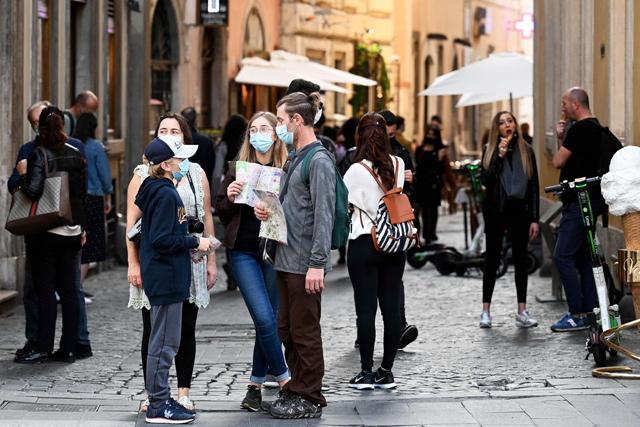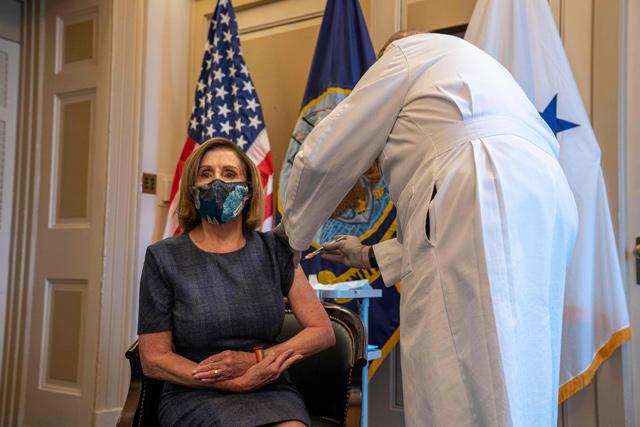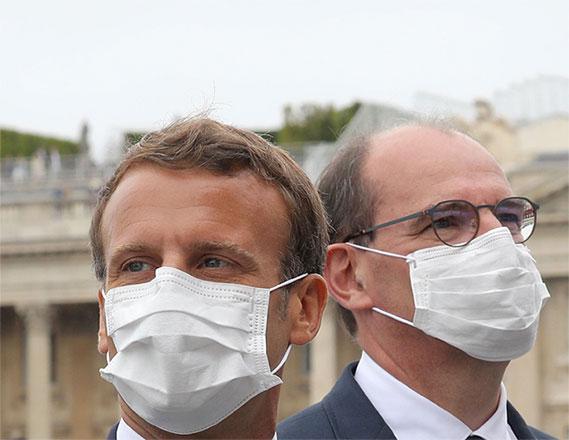You are here
Italy imposes tough virus curbs as US cases hit record highs
By AFP - Oct 26,2020 - Last updated at Oct 26,2020

Citizens and tourists wearing protective masks walk in downtown Rome, on Sunday, as the country faces a second wave of infections to the COVID-19 (AFP photo)
ROME — Italy unveiled tough new restrictions on Sunday to help curb surging coronavirus cases, while the pandemic has taken centre stage in the US election campaign as infections there hit record levels.
Spain was also mulling a new national state of emergency to enable it to impose curfews after it became the first country in the European Union to pass the grim milestone of 1 million cases.
The World Health Organisation (WHO) has warned of an "exponential" rise in infections threatening health systems' ability to cope with a second wave of the pandemic, testing many nations that appeared to have the virus under control earlier this year.
COVID-19 has now claimed the lives of 1.1 million people and infected more than 42 million globally, with the WHO warning the northern hemisphere was at an especially critical juncture with winter looming.
Governments are struggling to balance new restrictions against the need to revive economies already battered by earlier draconian lockdowns after the virus first emerged in the Chinese city of Wuhan late last year.
But populations weary of social isolation and economic hardship have bristled at the tougher measures including curfews and limits on social gatherings.
Youngsters ‘uncontrolled’
Italy, the epicentre of the first European outbreak, on Sunday tightened its anti-virus curbs despite opposition from regional chiefs and street protests.
Cinemas, theatres, gyms and swimming pools must all close under the new rules, which come into force on Monday and run until November 24, while restaurants and bars will have to stop serving at 6 pm.
The new measures were introduced just hours after dozens of far-right protesters in Rome clashed with riot police during a demonstration against a curfew, setting off fireworks, burning bins and throwing projectiles.
Elsewhere in Europe, Spain was bracing for a national state of emergency, overnight curfews and other new containment measures expected to be decided at a Cabinet meeting on Sunday.
“The curfew is good for those who are drinking in the street a lot lately, because at our age people go out a lot, they are uncontrolled and then what happens, happens,” said 17-year-old student Juan Pelayo in Valladolid, a town in the Castilla and Leon region which has gone ahead and introduced a nighttime curfew on its own.
“You can infect your parents, then your parents go to work, they infect everybody, you have to keep in mind that there are elderly people, and elderly people might die.”
‘Close to capacity’
The United States remains the hardest-hit country on the planet, and on Saturday it set a daily record for new COVID-19 cases for the second straight day, at nearly 89,000, with a further surge expected as cold weather arrives.
The virus has become a central issue ahead of the November 3 election, with President Donald Trump sparring over his handling of the pandemic with challenger Joe Biden.
And US Vice President Mike Pence’s chief of staff tested positive for COVID-19 on Saturday, the latest in a list of figures connected to Trump’s administration to do so.
“The idea that somehow this White House has done anything but completely screw this thing up is nonsense,” said Trump’s predecessor Barack Obama, who hit the campaign trail on Saturday to campaign for Biden, his former deputy.
The virus has claimed more than 224,000 American lives, with no end in sight, and a majority of voters say Trump has handled the crisis poorly.
After the US, the worst affected countries are Brazil, India, Mexico and Britain.
Colombia became the latest country to record a million confirmed COVID-19 cases on Saturday while France recorded a 24-hour record of more than 45,000 infections a day after passing the same milestone.
The French government has extended an overnight curfew to cover areas home to around 46 million people — two out of every three French.
“The difference compared to the first wave is that now we also have all the chronic pathologies of the winter period to take care of,” emergency doctor Agnes Ricard-Hibon told local television.
In neighbouring Germany, the city of Frankfurt became the latest to cancel its traditional Christmas market, which usually attracts more than 2 million visitors.
“The order of the day is to reduce contacts, [and] to meet as few people as possible,” Chancellor Angela Merkel said after Germany recorded its 10,000th coronavirus death on Saturday.
On Friday, WHO chief Tedros Adhanom Ghebreyesus warned that “too many countries are seeing an exponential increase in COVID-19 cases and that is now leading to hospitals and intensive care units running close to or above capacity”.
“We urge leaders to take immediate action to prevent further unnecessary deaths.”
Related Articles
WASHINGTON — The United States on Friday authorised Moderna's COVID-19 vaccine for emergency use, paving the way for millions of doses of a
PARIS — French President Emmanuel Macron became the latest head of state to test positive for coronavirus on Thursday, forcing several other
WASHINGTON — The United States reported record new coronavirus cases for the third day in a row, as Joe Biden vowed to act against the pande














